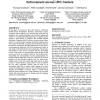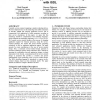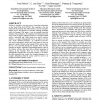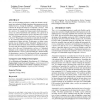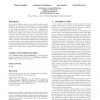137
click to vote
ICSOC
2004
Springer
15 years 7 months ago
2004
Springer
Service-oriented computing is meant to support loose relationships between organisations: Collaboration procedures on the application-level translate to interaction processes via ...
135
click to vote
ICSOC
2004
Springer
15 years 7 months ago
2004
Springer
Service oriented computing, with its aim of unhindered interoperability, is an appropriate paradigm for ad hoc networks, which are characterized by physical mobility of heterogeno...
153
click to vote
ICSOC
2004
Springer
15 years 7 months ago
2004
Springer
In this paper, we present an Open Grid Services Architecture (OGSA)-based decentralized allocation enforcement system, developed with an emphasis on a consistent data model and ea...
124
click to vote
ICSOC
2004
Springer
15 years 7 months ago
2004
Springer
Currently, service-oriented computing is mainly technology-driven. Most developments focus on the technology that enables enterprises to describe, publish and compose application ...
134
click to vote
ICSOC
2004
Springer
15 years 7 months ago
2004
Springer
CiteSeer is currently a very large source of meta-data information on the World Wide Web (WWW). This meta-data is the key material for the Semantic Web. Still, CiteSeer is not yet...
134
click to vote
ICSOC
2004
Springer
15 years 7 months ago
2004
Springer
This paper presents a method to implement integrated services of networked home electric appliances, which provide more convenient and comfortable living for home users. The conve...
143
click to vote
ICSOC
2004
Springer
15 years 7 months ago
2004
Springer
The e-services paradigm promises to enable rich, flexible, and dynamic inter-operation of highly distributed, heterogeneous networkenabled services. Among the challenges, a funda...
137
click to vote
ICSOC
2004
Springer
15 years 7 months ago
2004
Springer
Emerging Web services standards enable the development of large-scale applications in open environments. In particular, they enable services to be dynamically bound. However, curr...
ICSOC
2004
Springer
15 years 7 months ago
2004
Springer
126
click to vote
ICSOC
2004
Springer
15 years 7 months ago
2004
Springer
Over the last few years several process-based web service composition languages have emerged, such as BPEL4WS and BPML. These languages define the composition on the basis of a pr...

